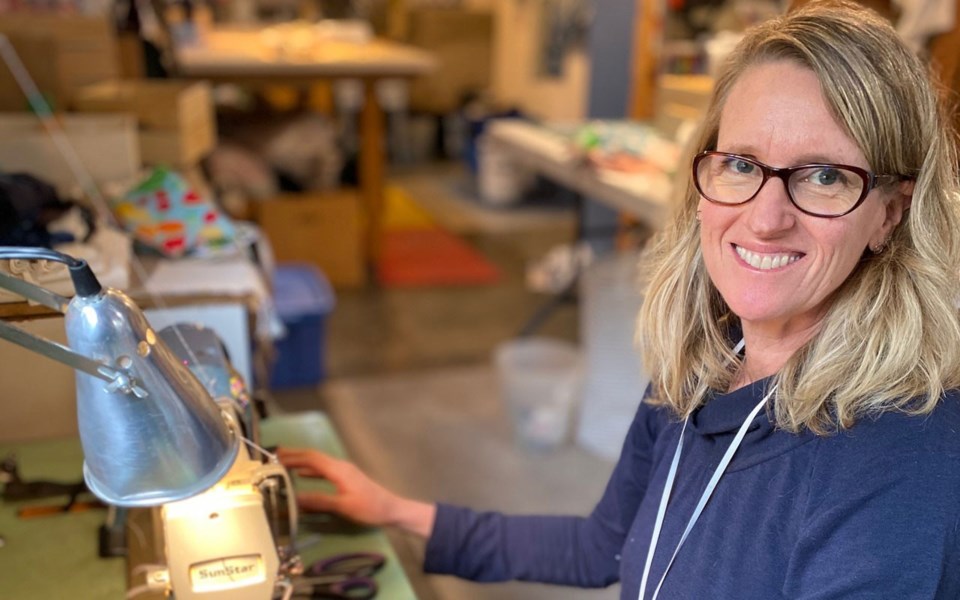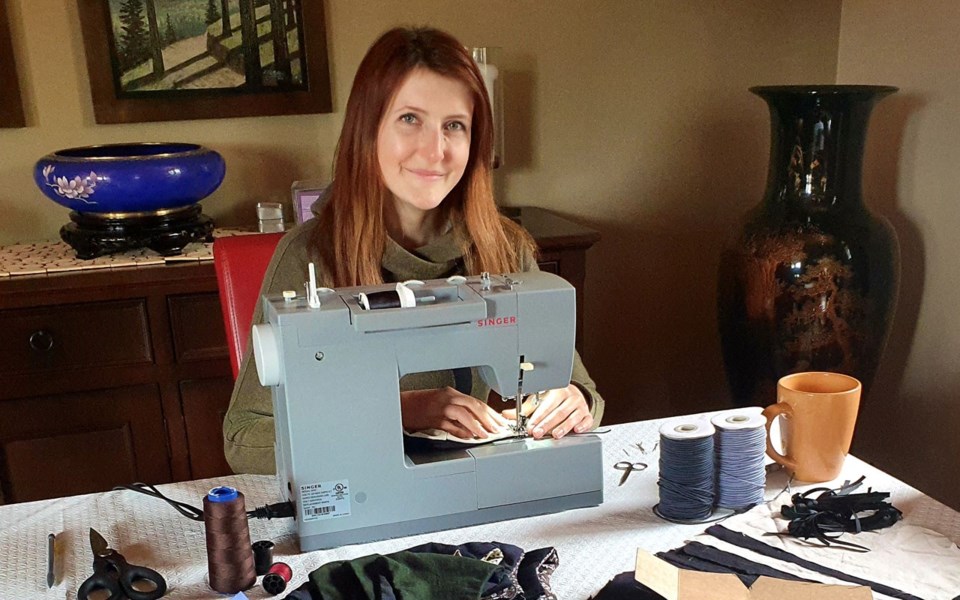
LIKE SO MANY others these days, Frances Dickinson has adopted a one-day-at-a-time mentality in handling the stress of COVID-19.
"No plans are being made, I feel like some days are great, some days are terribly dismal," Dickinson said with a chuckle, from her home in Pemberton.
"I'm still in shock over it all. When you walk through our little town and it's just desolate, with all this caution tape around the playground ... it's just crazy. It's a crazy time."
Thankfully, as the organizer of Pemberton's Boomerang Bags program, Dickinson has a built-in skill to help occupy some of her time at home—sewing dozens of handmade masks to offer free to the town's frontline workers.
Dickinson said she got the idea from some sewing groups in Washington state, which has been hit particularly hard by the virus.
"From what I can see, and what I'm reading, some hospitals are accepting anything down there—they are asking for these sewing people to make masks as quick as they can, and they're accepting them in their hospitals ... it's kind of crazy," Dickinson said, adding that she spoke with two friends who work in healthcare locally, who both said the need for masks hasn't quite reached that level.
"And then I just started thinking about all the people working out there in the coffee shops and the grocery stores. I went in there and it's all these young people working, and they had gloves on, and I just thought well maybe I could just make a few masks and put it out there, and see if people want them."
Dickinson notes her homemade masks are covers, meant to prolong the life of surgical masks but not replace them.
The response has been positive so far, she said, with several Pemberton businesses reaching out.
The effectiveness of wearing masks in public has been a hot topic since the outbreak began. In an email, a spokesperson for Vancouver Coastal Health said it has not advocated for the public to wear masks, adding that the best protection is to follow proper hygiene etiquette like hand-washing, covering your mouth when coughing or sneezing and staying home when sick.
Health Canada notes that homemade masks are not medical devices, and may not provide complete protection against viruses.
According to the World Health Organization, facemasks are only meant to be worn by sick people and healthcare professionals.
But in Michaela Kubátová's home country of the Czech Republic, the government made the use of masks mandatory for all—an action now being credited by some for flattening the country's COVID-19 infection curve.

Seeing the results back home, Kubátová—an interior designer by trade who recently lost her housekeeping job in Whistler because of the virus—opted to make her own masks, too.
"[There's] a lot of information everywhere—some people say that facemask doesn't work, some people say that it work very well—I can see that, just in my homeland, it works, so I am doing the same thing," Kubátová said.
"Because I have time now, and I'm creative, so I just ask [the Re-Use-It Centre] for some cotton material, they answered me that it's good idea, so I'm doing it."
After posting about her masks on Facebook, Kubátová said she's had tons of messages from individuals and local businesses expressing interest.
She's offering the masks by donation, and plans to donate half of the proceeds to the Whistler Community Services Society.
"We are super busy and we are trying to do our best and make as many as possible of them," she said.
"I love the idea of up-cycling and I am creative person so hopefully this connection can help others and I believe it can help stop spreading this disease."
Dickinson has done her own share of reading about the effectiveness of masks, finding that the opinion is somewhat split.
"It's not necessarily going to protect you if someone coughs in your face who has COVID-19., but if you yourself have a common cold, or anything, you're going to be preventing that from possibly spreading," she said.
"Personally, when I wear one, it makes me very conscious that I have something on my face, and it actually stops me from touching my face more ... so there's a lot of little areas that I think it's helping people with."
Along with offering the masks free for frontline workers, Dickinson is selling the masks for $10. She's also encouraging anyone who wants to help sew masks to get in touch. Reach her by email at [email protected].
"It does make me feel like I'm doing something, because I think, yeah, we do a feel a little bit frustrated you know?" she said.
"We can't work, we can't go about our day, and so to just be able to help out in any way, it's a great positive distraction."
Read more from Health Canada here: https://www.canada.ca/en/health-canada/services/drugs-health-products/medical-devices/activities/announcements/covid19-notice-home-made-masks.html



